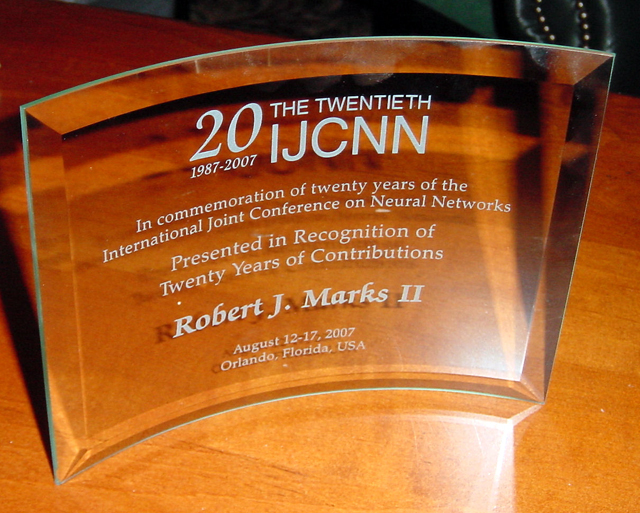Baylor Professor Recognized as Pioneer in Neural Networks

by Katie Brooks, student writer.
Robert J. Marks II, Distinguished Professor of Electrical and Computer Engineering at Baylor University, was recently honored as a "pioneer in the field of neural networks" at the International Joint Conference on Neural Networks, one of the premier conferences in the field of neural networks. Marks was among eight others recognized for their contributions at this year's conference, held in Orlando, Fla.
"Being honored by your peers is always a gratifying experience," Marks said.
Working in the area of computational intelligence and neural networks for more than 20 years, Marks said the two largest impacts of neural networks on society are fraud detection and power load forecasting.
"Working with Mohamed El-Sharkawi at the University of Washington, we were the first to suggest neural networks could be used by power companies to estimate how much power they would have to deliver the next day," Marks said. "Currently, nearly every power company in the world uses neural networks to make these forecasts."
Marks also is considered a leading expert in computational intelligence, which is the "next step" of artificial intelligence. Marks and Dr. Randall Jean, an associate professor of electrical and computer engineering at Baylor, have used neural networks - computers that work similarly to the brain - to help the paper manufacturing industry. Marks has worked with NASA to apply swarm intelligence to wireless sonar arrays and has worked with Dr. Russ Duren, an associate professor electrical and computer engineering at Baylor, to implement neural networks and swarm intelligence on electronic chips. He also has worked with Dr. Ian Gravagne, an assistant professor or electrical and computer engineering at Baylor, to develop models for the behavior of swarm intelligence.
Marks received his doctorate in electrical engineering from Texas Tech University. He came to Baylor from the University of Washington, where he was professor of electrical engineering and was graduate program director from 1996 until 2000. He is a fellow of the Optical Society of America IEEE. He has been recognized as an IEEE Distinguished Lecturer and has received the IEEE Centennial Medal and Certificate.
He has served as an editorial board member for numerous publications such as the Journal of Intelligent Control, Neurocomputing and Fuzzy Logic, Journal of Advanced Computational Intelligence and International Journal of Neurocomputing.